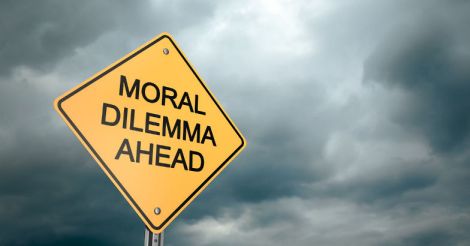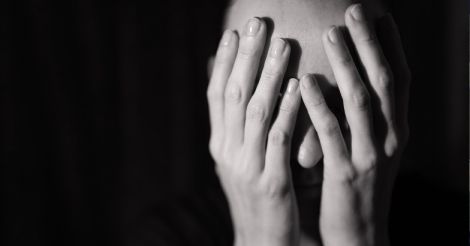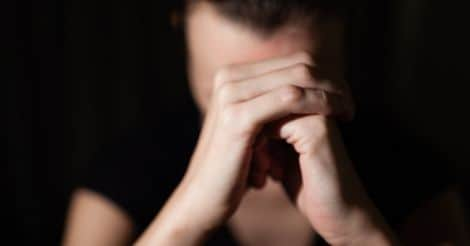The renowned American psychiatrist, Karl Menninger, once said that if he could convince his psychiatric hospital patients that their sins were forgiven, three out of four of them could walk out the next day.
Psychologists of a more recent vintage go further: guilt, they say, is a useless emotion, a destructive emotion, a sign of an unhealthy psyche. Wayne Dyer, whose self-help book, “Your Erroneous Zones”, remains one of the best-sellers of all time, pronounced that our “guilt zones” must be “exterminated, spray-cleaned and sterilized forever.”
Also read: Heal Thy Self | Be an optimist in two weeks
That decree has been adopted and promulgated so often on talk shows, in motivational videos, on desk calendars and on T-shirts that it has speedily made the transition to a maxim for good living. Down with guilt. Up with self-esteem. Learn to love yourself – and live happily ever after. So the recipe goes. And it can sound so right.
So, is guilt really just a creepy-crawly psychic pest that we need to “spray-clean… sterilize… exterminate”? Or do the pop psychologists and new-age theologians paint with too large a brush? Does guilt have a valid role in our lives?
If it seems that an inordinate amount of heat and dust has clouded thinking about this uniquely human emotion, it probably has to do with the fact that guilt lies right at the thorny intersection where remorse meets masochism. Central to any definition of guilt is the concept of self-reproach. “I feel like scum”, “I am rotten to the core”, “I hate myself” … these kind of chastisements are common in a person groping in the inky blackness of guilt. In turn, they trigger off an upchuck of self-accusatory chatter in your mind -- most of it centring around the ‘Whys’. Examples:
 Photo: Getty Images
Photo: Getty Images» Why did I do what I did?
» Why did I say that?
» Why didn’t I see what was going to happen?
» Why did I drive too fast?
» Why didn’t I take him to the doctor sooner?
» Why didn’t I say goodbye when I had the chance?
» Why do I always…?
» Why do I never…?
From the self-condemnation that lies at the core of guilt comes the feeling that you deserve to be punished, and the corollary conviction that you will be punished.
Origins of guilt
How did such a powerful, overwhelming emotion get into our psyches? Well, once upon a time, you were a child. And, being a child, you naturally lacked good judgement and the capacity for moral decision-making. In other words, you didn’t know right from wrong. To help you develop those concepts, your parents imposed a system of rewards and punishments. Even if, as a child, you could not understand right and wrong, you could understand reward and punishment. And, as a child, your biggest reward was the approval and love of your parents and other authority figures like your teachers. So, your actions began to be based upon the desire for approval on the one hand, and the fear of reprimand on the other. This inculcation of right and wrong is a cultural task that all families are expected to undertake and it leads to the development of conscience in a child.
 Photo: Getty Images
Photo: Getty ImagesAlso check: Heal Thy Self | 21 ways to simplify your life
But what if those moral standards inculcated in childhood are too rigid, too unrealistic, what if the punishment is excessive, unrelenting? You can then end up with neurotic anxiety over real or imagined wrong-doing, with guilt and shame when none is called for, with a hyperactive conscience that keeps you forever hooked on to other people’s opinions and approval.
Consider this far-from-uncommon scenario:
A five-year-old enjoys the meal that his mother has put before him, and stops eating when his tummy is replete with satisfaction. But his mother is instantly irate that he hasn’t eaten everything on his plate, and as she takes the leftovers away, she yells at him: “Do you know there are children starving in Africa?” The child’s face falls. He has been made to feel guilty about being contented with eating to his own satisfaction, also made to feel guilty by implication for consequences that he has not caused (starving children in Africa). And he is left without any way to make amends to his parent – except by forcing down every morsel that is henceforth put before him. If the mother’s tirades about wastefulness are repeated often enough, the child (unless he has been ‘blessed’ with a wilful, contrary temperament) ends up, in effect, ‘learning’ to feel guilty if he does not lick his plate clean or vacuum-suck every miserable drop out of a straw.
Children growing up in families where these drumbeats of guilt are sounded loud and often, gradually “get the message”: They have “learned guilt” and, in the process, they have been killed off as self-directed, special, valuable people. Over the long term, even trivial infractions brought to their notice by any authority figure (parents, teachers, employers) kick off a knee-jerk reaction of guilt, a sense of failure and diminished self-worth. To protect themselves (and this is an unconscious reaction), they learn to forestall external criticism by developing an “Inner Critic” that imposes ever-harsher strictures on themselves. Here are some examples:
I should always put others first.
If something is worth doing, it is worth doing perfectly.
If someone does not seem to want to be my friend, there must be something wrong with me.
I should never say ‘no’ to someone else’s request because it will hurt them.
I should never burden others with my problems and fears.
The diktats of religion are another major and enduring source of guilt. The concepts of sin, guilt, punishment, hell lie at the core of Christianity, for example. The central message of guilt continues to sound an unceasing beat throughout the lives of Christians (with, for instance, relentless reminders that “Christ died for our sins”). So insidious is this notion of Christian guilt, that even those who opt out of the religion find themselves still trailed by the miasma of guilt: it hangs in there at the gut-level and continues to direct their actions and their lives.
Religious and cultural taboos, imbued early in life, can be a source of guilt when they are flouted. They include dietary restrictions (e.g., ban on beef-eating among Hindus; halal and kosher diets in the Islamic and Jewish religions) and strictures about exposure of body parts (e.g., purdah, nudity).
The norms and expectations of Society with a big ‘S’, can also wield enormous pressures to toe the line; they include the flavours of the day. For instance, the cultural worship of physical perfection in modern communities spawns guilt in those who fail to live up to appearance ideals flaunted in the media and by the booming beauty business. Guilt over a less-than-perfect figure can lead to starvation diets, weight-loss pills, diuretics, extreme exercise routines and anorexic /bulimic behaviour.
Healthy Or toxic?
 Photo: Getty Images
Photo: Getty ImagesDoes all this mean that guilt is a low-rent, meat-and-potatoes emotion we are all better off without? Many spiritual and religious leaders, philosophers and psychologists would not agree. Guilt, they would say, does not in fact get the respect it deserves today. And the latest research would seem to back their conviction. A meta-analysis (which reviewed the findings of tons of earlier research on guilt) found that guilt serves some very useful social functions in three ways:
» Guilt can promote closeness and emotional harmony by making people pay more attention to their partner's needs and emotional soft spots.
» It can help relatively powerless souls get their way through the ubiquitous “guilt trip”.
» It can help to rectify a volatile situation by making a wrong-doer “feel bad” about his or her transgression, which in turn can actually reduce the suffering of the victim involved.
The study leaders concluded that the roots of guilt lie in empathy, or a person’s ability to feel the pain of others, as well as fear of alienation by the social group. In other words, guilt is really something between people, not just something inside them -- a kind of social glue.
Coping with guilt
It’s easy to see that guilt has its uses and its upside. Healthy guilt is a gatekeeper and a boundary-maker. Driven by conscience, it motivates people to apologize, to attempt to make amends, to try to repair damage to relationships, to confess wrongdoing and seek forgiveness, and to change their behaviour for the better. So, if guilt serves one or more of these functions and then allows you to get on with your life, it will have played a positive role.
 Photo: Getty Images
Photo: Getty ImagesBut, all too often, guilt can become a toxic, even a pathological, emotion when, for instance, it is unwarranted, excessive, entirely unproductive, even self-destructive. When the urge to hurt is turned against the self, then you’ve lit a fire under a pot that can keep you stewing in your own juice, sometimes over a lifetime.
The road-map, below, can serve as a guide to help you recognize whether your guilty feelings are valid or distorted, and to explore how you can deal with them healthfully in either case.
» Is your guilt unwarranted?
Guilt that is based on irrational thinking is far more common than we might believe. Very often, with hindsight, especially after a tragedy, we keep berating ourselves with all kinds of “Shoulds” and “Should nots”. We could have done more, we should have handled a situation differently. But hindsight is a great deceiver. It stems from what is known as “the illusion of control”. As humans, it comes more naturally to us to believe that when something bad happens, it must have been the result of some wrongdoing, than to accept that some things just happen because of the inevitability of circumstances or because of dumb luck. Irrational thinking, driven by emotion rather than by logic, is more likely when there has been loss of life or when it is a loved one, especially a child of ours, who has suffered. No matter how far away you were at the time and how powerless to avert an event, a child’s misfortune or tragedy always feels like your fault– something you did or did not do. Our children depend so completely and so trustingly on us, and their conviction that we will protect them always is contagious.
The question you need to ask yourself is: “With the information and perspective and resources I had at the time, was there anything I could have done to prevent this from happening?”
This is a way of putting your guilt under the microscope and doing a reality check on it: “Am I really guilty of what I'm telling myself, or is this a case of false evidence appearing real? ….Did I consciously and wilfully do something that I shouldn’t have done? Or am I irrationally expecting myself to be perfect/ all-knowing / all-powerful?”
Berating yourself with “shoulds” and “coulds” is unrealistic because they imply you are expected to be omnipotent, able to completely predict the future. And, to the extent that they do not represent sensible moral standards, the guilt they generate is inappropriate.
» Are you magnifying your mistake out of all proportion?
Sometimes you may in fact have made an error that justifies a degree of remorse and regret. But is the load of self-blame that you heap on yourself out of all proportion to the enormity of your offence?
To determine whether you’re beating up on yourself too much, here are the questions to ask yourself:
“Is the behaviour that I am condemning in myself so terrible or immoral?”
“Is the intensity of my guilt appropriate to the mistake I made?”
To the extent that your self-persecution is far out of proportion to your transgression, it is a degradation of your self-esteem that blinds you to living in the here and now.
There’s an aphorism we often toss off in casual conversation without paying much attention to how true it is: “I’m only human”. Psychotherapist David Burns has created a delightful but spot-on syllogism around that truth:
“All human beings goof up from time to time”
“I am a human being”
“Therefore I should goof up from time to time”
That’s one “should” we can all live with.
» Is an apology called for?
 Photo: Getty Images
Photo: Getty ImagesWhat if you have willfully and needlessly acted in a hurtful or harmful manner towards another person? As humans, we don’t like the uncomfortable sensations that come from wrongdoing. Even less do we like the idea of owning up to a wrong: Why reveal a foolish choice or a dumb mistake? We are often too prideful to accept that an apology is called for, so instead of saying we’re sorry, we either rationalize (“I was having a bad day”), or we take on board some of those handy new-age aphorisms to give ourselves an exit route: “Well, I’m just going to forgive myself… “
But this amounts to rubbishing our responsibility, and it’s a falsity. It refuses to recognize the God-given value and dignity of the person you’ve injured. Regaining true peace after you’ve done an injury to someone involves re-training yourself to replace the feeling of guilt with that of responsibility.
There are 4 parts to reparation and restoration. They are:
1. Acknowledging the offence
2. Offering an explanation
3. Expressing remorse
4. Offering restitution
When the attempt at reparation fails, it is generally because at least one of these parts is missing or has been corrupted in some way or other. The most common failing is not acknowledging the offense, even though on the face of it you are making an apology, or making-believe that you are. Often, an apology falls on its face because of the games people play, which include some very tricky word play designed to protect our pride:
“If I upset you, I am sorry.”
“Mistakes were made.”
“I'm sorry for whatever I did.”
None of these acknowledges the offence, and therefore none of them can restore dignity to the offended person. Because they constitute a fake apology, they will also not alleviate your guilt because, at the core of your being, you know that you’ve not accepted responsibility. If this travesty of an apology is your normal style of restitution, one direct way to crush the block of conceit and to bolster self-awareness is to ask yourself, “If someone did that to me, would I have been satisfied with this kind of apology?” This can cut through confusion like a knife.
If you feel guilty about something which happened a long time ago and it doesn't appear that amends can be made to a living person, you can still send out the intention of making amends. Write a letter, saying everything you did for which you're sorry. Address the letter to the Universe or to God; then burn the letter. A ritual can be a powerful way of releasing the bonds of guilt. It’s used in therapy very often and with considerable success.
Forgive yourself.
 Photo: Getty Images
Photo: Getty ImagesWhile you're writing letters, write one to yourself, forgiving yourself for something you may have done to hurt or injure another. Write this letter with love, respect and appreciation for yourself as someone who is a good person, a worthy person, and a person who is not perfect.
Because that’s who you are.
When nothing else works, there’s therapy.
Sometimes a person is not even consciously aware of underlying guilt. Especially when the guilt is deep-seated and has its roots in early childhood, the psyche protects itself against the disequilibrium by bringing one or more of its defense mechanisms into play. The most common one in the case of guilt is repression: you simply get those unpleasant and guilty thoughts out of your conscious awareness by pushing them down into your unconscious mind. Unconscious guilt is the most difficult kind to deal with because we are not directly aware that what we are feeling is guilt. You may feel depressed or suffer from chronic anxiety, or you may indulge in self-destructive behaviour such as alcoholism or overwork without making the connection with guilt. In this case, counseling can help to put you in touch with your guilty feelings by bringing them to the surface where they can be dealt with. A client will often come into counseling for a problem of, say, depression, but talk therapy uncovers the repressed guilt.
Also, therapy is invaluable for the opportunity it provides for catharsis. There are sometimes guilt-laden experiences (the guilt felt by the victim of childhood sexual abuse is a good example) that a person will not talk about even to a friend. But therapy provides a holding environment, a place of acceptance, interest and concern for the client so that he feels it is safe to talk about what he considers the most terrible, shocking, guilt-inducing experiences, wishes, feelings. Guilt works in secret, and it can begin to lose its power when it is allowed out into the open.
(The author is a former editor of 'Health & Nutrition' magazine, and now works as a counseling therapist)
Read more: Latest from Wellness | Mind | Heal Thy Self | Be an optimist in two weeks

























 Photo: Getty Images
Photo: Getty Images